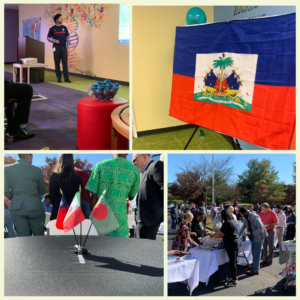
In Conversation with Rafiq Islam, Ph.D., Vice President, Bioanalysis and Biomarkers at Amador Bioscience and Maryland Site Head
By Sarah Ellinwood
February 7, 2023
Amador Bioscience is a translational and early clinical development partner for companies developing new drugs. Make no mistake, though – Amador is different from many Contract Research Organizations (CROs) out there, using the latest scientific advancements as its north star to guide its decisions. The company leans on its technology-driven and AI-enabled capabilities to modernize clinical research and bioanalytical testing to accelerate new drugs through the development pipeline.
Since its founding in 2018 in Pleasanton, CA, Amador has made considerable strides, having closed its Series B round in 2021 and along the way growing its reputation as a top-notch partner for companies around the world. Amador’s clients include high-profile biotechs and biopharma companies such as AstraZeneca, Gilead, Roche, Immunocore, BeiGene, and I-Mab, among others. The company works across the entire spectrum of research and clinical development, from preclinical all the way to Phase III and even Phase IV.
Right now Amador has about 200 employees globally across the United States, China, and Europe. This past fall, the company held its ribbon-cutting event to celebrate the opening of its newest office and GxP facility in the heart of Germantown, Maryland. The company has big plans to continue growing into its space on Century Blvd, with an additional 10,400 square foot construction currently underway above its initial 10,000 square feet of space. The expansion, which is poised to include both office space and GxP labs, is planned for completion early this year, making room for more scientists to join the team.
We caught up with Rafiq Islam, VP of Bioanalysis and Biomarkers and Maryland site head, to learn more about what makes Amador unique, why the company decided to set up its new offices in Germantown, Maryland, and how the company maintains a strong company culture across multiple sites.
What makes Amador different than other CROs?
Believe it or not, clinical development hasn’t really seen much change since the first recorded clinical trial in 1943. There’s been some improvement over the years, such as data management now being recorded electronically rather than written by hand by investigators, but innovation has largely been scarce. Despite incredible advancements in technology – wearables, telemedicine, high-throughput technologies, digitalization, etc. – investigators also still largely rely on patients traveling to a clinical site for their studies.
We’re long past due for change.
Many CROs perform like factories, with the goal of maximizing productivity. For us, we focus more on maximizing value across the R&D value chain, leveraging machines in a way that frees up our scientists to focus on the work and critical thinking that machines cannot do. Amador also provides a multitude of flexible solutions all under one roof – everything from translational and clinical pharmacology to medical writing and regulatory affairs to helping to build a clinical site network. This not only helps to expedite processes, but it provides high-quality experience and deliverables for our clients.
Further, our team has unparalleled capabilities to pull together a lot of immunogenicity assessment data, which is critical in understanding how a patient’s body responds to a biotherapeutics treatment. The evaluation of the risk associated with immunogenicity, which is a component of the overall benefit-risk assessment, is crucial to the development of novel biotherapeutic drugs. Robust assessments of the risks associated with immunogenicity require innovative methodologies combined with state-of-the-art technologies, clinical pharmacology expertise and regulatory knowledge. Amador is one of the few companies with multi-disciplinary expertise to support clients in navigating through BLAs, NDAs, and ANDAs processes successfully.
What steps is Amador taking to modernize drug development? How are you making the process more efficient while still ensuring quality?
Amador is taking advantage of the vast technology at our disposal, modernizing clinical development by leaning in on in silico work. A key part of our strategy is using bioinformatics and existing genomic databases to create models and biosimulations that help guide clinical trial development, including reducing the number of patients needed for a control group.
You might have a stellar clinical protocol, but if you’re unable to recruit enough patients to your study you won’t be successful. Enrollment is undoubtedly top of mind for clinicians – by leaning on wearables, data readouts, and existing genetic data we can reduce the number of control patients needed to be able to get a good statistical assessment of the data. Amador is combining computational tools with real world patient data enabling our clients to generate scientifically-sound evidence for regulatory decisions in an efficient and cost-effective manner.
Amador has offices across the globe (US, Europe, Asia), and you just recently had a ribbon cutting for your Maryland facility in Germantown. Tell us more about why you chose Germantown and how the Maryland facility plays into the bigger vision for the company
When thinking of where you want to build a new office, you want to consider how quickly you can recruit talent. Given that Maryland is home to incredible universities such as the Johns Hopkins University and the University of Maryland as well as federal agencies such as the NIH and FDA, we know that we’d be able to recruit in Maryland quicker than other parts of the country.
Our Germantown office is currently our largest site in the United States, and we are already in the process of growing the site even further. Right now we’re working to add additional office and lab space on the floor above us, which is planned to be completed early this year.
Everywhere we go, we also make it a priority to work with local universities. For example, at our University of Michigan site in Ann Arbor our staff has taught classes in the pharmaceutical department. We hope to establish similar relationships with our neighboring universities in Maryland.
What type of roles will you be hiring for in Maryland in the near future, and what traits/skills does a person need to be successful at the company?
We of course need employees with certain technical expertise, but we also look for team players who want to learn about all facets of drug development. At the end of the day, drug development is a team sport – to find the most success, you need to understand the other areas of the business that have an impact on you or that you have an impact on.
A good example is our immunogenicity staff – you have scientists doing the experiments in the lab, the statisticians analyzing data in the scope of the bigger picture, and clinical staff evaluating PK/PD and safety implications. They all need to work closely in tandem and talk to each other, otherwise the project risks failure.
Maintaining a strong company culture between multiple sites can be challenging – tell us more about how you all are achieving this.
We maintain a strong company culture by :
- Utilizing an onboarding process that is driven by current best practices. We place emphasis on our core values, especially Unity and Excellence. This way we can ensure that employees know we are united together and operating with the highest levels of excellence. Everyone likes to be excellent!
- We encourage our sites to operate with autonomy and to pursue team-building activities that best fit the site’s micro-level culture. On a global scale, we also have events such as our recent worldwide Christmas Tree Decorating competition amongst the 3 US sites and our EU & China sites. This friendly competition brought out a real sense of unity among our sites that transcended our cultural backgrounds.
- Aligned training programs: We do organize virtual trainings and brown bag lunch trainings aimed to develop employees’ technical and soft skills. These are currently aimed at further developing our leaders since we have identified a large amount of first-time leaders on our team. Luckily we also have a plethora of highly experienced leaders that help give input on these trainings and attend them to contribute to our conversations.
- Strong internal communication platforms and tools: We do have a bi-monthly HR Newsletter shared globally to employees providing them with the information relating to benefits, new policies, new hires, each department’s achievements, etc. We also organize Quarterly All Hands Meetings to share the organization’s achievements, goals, the leadership’s vision etc. In addition, we use the technology available to ensure that our employees are able to communicate with each other easily.
Want to connect with the team to see how they can help in your drug development efforts? Reach out through their “Contact” page.
Excited and want to be a part of Amador’s mission? Check out their open positions on their Career Center.
- About the Author
- Latest Posts
Sarah Ellinwood is BioBuzz’s Managing Editor. A scientist by training and a science communicator at heart, Sarah specializes in making complex concepts understandable, engaging, and exciting. She received her Ph.D. in molecular and cellular biology with a focus in infectious disease immunology from the University of Maryland and is passionate about all things related to scicomm, peer mentorship, and women in STEM.








